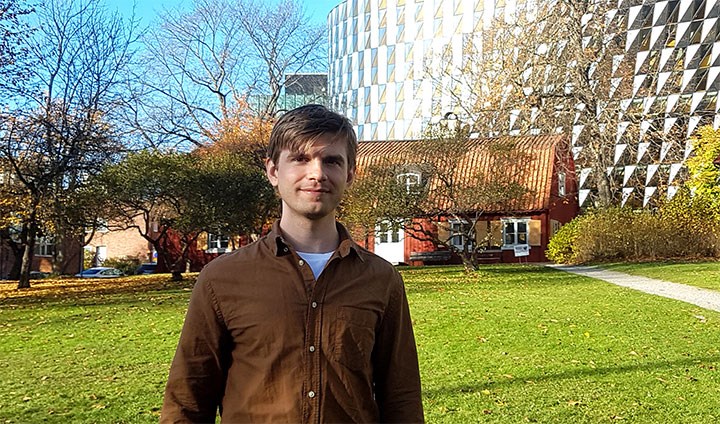“A masters in statistics makes you much more attractive in the labour market”

"The demand for statisticians is ever-increasing", says Hugo Sjöqvist.
Hugo Sjöqvist is a statistician in a research team at the Karolinska Institute, in which he maps risk factors and works to prevent mental health problems, such as suicide and depression. "My expertise as a statistician is important and appreciated".
Hugo Sjöqvist is from Täby, outside Stockholm, and chose to study both the Bachelor’s Programme in Statistics and the Master’s programme in Applied Statistics at Örebro University. After working a year as a statistician at a consulting company, he began work as a statistician in a research team at Karolinska Institutet.
What does a statistician do?
“I am a biostatistician and part of a research team that focuses on mapping and understanding risk factors linked to psychiatry, such as suicide, autism, ADHD and depression. In my role, I work with researchers, doctoral students and master’s students and support them with statistical methods and applications. I also teach biostatistics to master’s students in epidemiology.”
What is the best thing about working as a statistician?
“As a statistician, you can work with everything from data or method development to teaching, so it’s quite broad. What I like about my job is that I never work alone, but in cooperation with others with various professional backgrounds. I sense that my expertise really contributes. Working as a statistician is a very satisfying job, and I feel my role is appreciated.”
What does the labour market look like for statisticians?
“Statisticians are in short supply, since those in training are fewer than those who’re going to retire. Right now there is also a digitalisation taking place, where we’ve gone from working with paper to having giant servers with data, so the demand for statisticians is ever-increasing. Almost everyone I studied with are now working in jobs relevant to their study programme. A master’s degree also makes you much more attractive on the labour market.”
Why should one get a master’s degree in statistics?
“During the master’s programme, you dive deeper and develop an understanding of how to apply what you learned in the bachelor’s programme. You gain knowledge which allows you to advance on your own and learn more. This leads to more independent thinking and provides you with the conditions to further develop once in a professional work environment.”
What was it like studying at Örebro University?
“I love Örebro University! Everything is close to campus, and there’s good support when it comes to everything from finding housing to getting advice from study counsellors or help from teachers. Örebro isn’t a huge city, but that’s part of its charm. During my bachelors, I had time for student life. While in the master’s programme, I worked as a teaching assistant as well as having an hourly job in a research team, so there wasn’t as much time for fun.”
Text: Anna Lorentzon
Photo: Private
Translation: Jerry Gray
